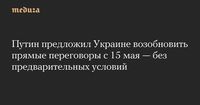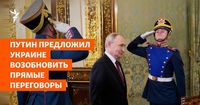In a significant development regarding the ongoing conflict between Russia and Ukraine, President Vladimir Putin has proposed to resume direct negotiations with Ukraine, set to take place in Istanbul on May 15, 2025. This announcement comes after a three-day ceasefire declared by Russia, which expired on May 11, 2025, coinciding with the Victory Day celebrations. Putin's proposal emphasizes the need for negotiations without any preliminary conditions, marking a notable shift in the diplomatic landscape.
During a press conference held in the Kremlin late at night on May 11, Putin stated, "We propose to the Kyiv authorities to resume negotiations, interrupted by them at the end of 2022. To start without delay already next Thursday, May 15, in Istanbul, where they were held earlier and where they were interrupted." He reiterated Russia's readiness for serious discussions aimed at resolving the underlying causes of the conflict and establishing a long-term peace.
Putin's comments came shortly after a summit in Kyiv involving leaders from France, Germany, Poland, and the UK, where Ukrainian President Volodymyr Zelensky put forth a proposal for a 30-day unconditional ceasefire, beginning May 12, 2025. This proposal was met with skepticism by Putin, who rejected the idea of a truce and instead pointed to what he described as five targeted attacks by Ukraine during the ceasefire period. He accused Kyiv of violating previous ceasefire agreements, stating, "During these three days of announced ceasefire, there were five targeted attempts to attack the Russian Federation."
The Russian President's invitation for negotiations has placed Kyiv in a precarious position. While Ukraine and its allies have insisted that meaningful talks can only commence under a complete cessation of hostilities, the Kremlin's insistence on negotiating without preconditions complicates the diplomatic dialogue. Putin's assertion that the ball is now in Ukraine's court adds pressure on Zelensky, who has faced calls from Western leaders to engage in talks.
Putin's speech, which lasted less than 20 minutes, was notable not only for its content but also for its timing, occurring after a period of heightened tensions and military actions. He emphasized the importance of Turkey's President Recep Tayyip Erdogan in facilitating these negotiations, reflecting on Turkey's previous role as a mediator in the discussions that took place in 2022. Putin expressed hope that Erdogan would confirm Turkey's willingness to assist in organizing the talks.
Despite the potential for dialogue, the backdrop of ongoing military actions complicates the situation. On May 10, 2025, Zelensky and the Western leaders had called for a ceasefire, warning that any conditions set by Russia would be viewed as attempts to prolong the war. British Prime Minister Keir Starmer remarked, "If Putin thinks about peace, now is the time to demonstrate it," highlighting the urgency for a resolution.
Putin's proposal marks a return to the negotiation format that previously stalled in 2022, where discussions centered around Ukraine's potential neutrality and security guarantees. However, the atmosphere has changed significantly since then, with the annexation of territories and increased military engagements altering the stakes for both sides. The Russian President's insistence on addressing the "root causes of the conflict" raises questions about Russia's willingness to compromise on its demands.
As the situation unfolds, it remains unclear how Ukraine will respond to Putin's call for negotiations. The complexities of the conflict, including the status of occupied territories and the security guarantees required by Ukraine, pose significant challenges. Observers note that any agreement reached must ensure genuine peace and not merely serve as a temporary pause in hostilities.
In the wake of Putin's announcement, international reactions are expected to play a crucial role in shaping the next steps. The United States and its allies have indicated a readiness to impose further sanctions on Russia should it reject the call for a ceasefire. The diplomatic landscape is fraught with tension, as both sides prepare for a potential return to the negotiation table.
As the world watches closely, the upcoming discussions in Istanbul could either pave the way for a new phase in the peace process or further entrench the divisions that have characterized this prolonged conflict. The stakes are high, and the path to resolution remains fraught with uncertainty, but the prospect of dialogue offers a glimmer of hope amidst the turmoil.


